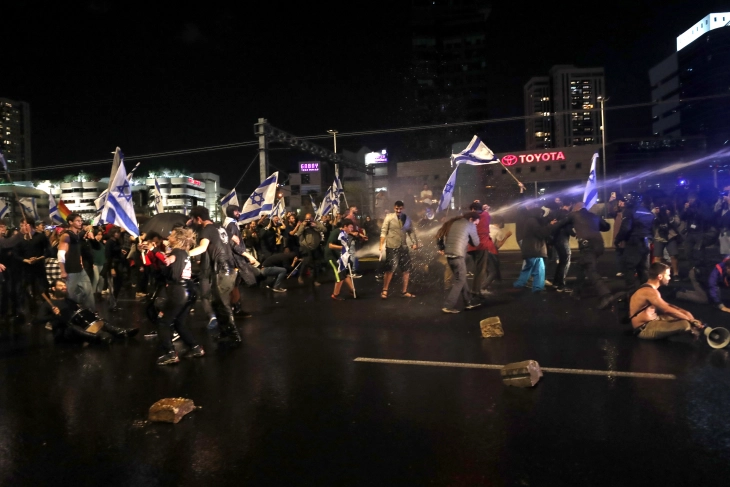More than 450,000 Israelis protest despite delay to judicial reform
- More than 450,000 people demonstrated throughout Israel on Saturday, despite a delay announced by government to controversial judicial reforms.
- Post By Silvana Kocovska
- 12:57, 2 April, 2023

Tel Aviv, 2 April 2023 (dpa/MIA) - More than 450,000 people demonstrated throughout Israel on Saturday, despite a delay announced by government to controversial judicial reforms.
Rallies were held in Tel Aviv, Jerusalem and other cities, with the largest, in Tel Aviv, drawing 170,000 people, including opposition leader Yair Lapid.
There were isolated clashes with the police, and officers arrested some demonstrators. Police in Tel Aviv used water cannon on the demonstrators.
Some protestors waved Israeli flags, or held signs that read, "democracy is stronger than this government."
Israel has been roiled by similar mass protests for 12 consecutive weeks, due to plans for a highly controversial judicial reform.
The reform was postponed by Prime Minister Benjamin Netanyahu for a few weeks on Monday after massive protests and a general strike, in order to "make room for dialogue."
Talks have been held since Tuesday between the governing coalition and the opposition in an attempt to resolve the issue.
But opposition politicians have repeatedly questioned Netanyahu's seriousness in wanting to reach a compromise.
"Netanyahu's attempt to put the protesters to sleep failed," said the organizers of the Umbrella movement later on Saturday. "Over 445,000 pro-democracy demonstrators took to the streets of Israel tonight, in one of the largest demonstrations in Israeli history. We will continue to be in the streets, until we guarantee that the State of Israel is a democracy."
Earlier, the organizers said that the government did not want to reach an agreement. "It just wants to buy time to enact a judicial coup," they said.
They said it was the people's responsibility to protect democracy, declaring "this is the most critical time since the founding of the state."
With the judicial reform, Netanyahu's far-right coalition is seeking to curtail the influence of the Supreme Court and expand the government's power.
It accuses the court of excessive interference in political decisions.
In the future, parliament would be able to overturn decisions of the Supreme Court with a simple majority under the proposed changes.
Critics see the separation of powers in danger and warn of a state crisis if the reform is implemented in this way.







